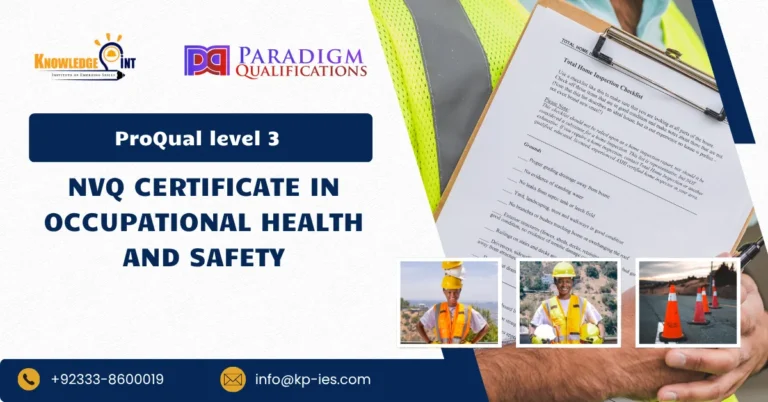Are you ready to take the first step toward a rewarding career in environmental engineering? The ICTQual Level 3 Diploma in Environmental Engineering offers a fast-tracked, 6-month program designed to provide essential knowledge and practical skills in environmental management and sustainable practices. This 60-credit diploma serves as an excellent foundation for further study or entry-level roles in the environmental sector.
This intensive program introduces fundamental concepts in environmental science and engineering. You’ll explore key topics such as pollution control, renewable energy systems, and sustainable development. Designed for students and professionals seeking a quick, focused introduction to the field, this course provides a balanced mix of theoretical knowledge and practical application.
The ICTQual Level 3 Diploma in Environmental Engineering is your stepping stone to a meaningful career in environmental management. In just six months, you’ll gain the essential skills and knowledge needed to make a positive impact on the world around you. Whether you’re beginning your career or looking to upskill, this program offers the perfect blend of practical learning and foundational knowledge.
Course Overview
The ICTQual Level 3 Diploma in Environmental Engineering 60 Credits – 6 Months consists of 6 mandatory units which are as follows.
- Fundamentals of Environmental Engineering
- Sustainable Development and Green Engineering
- Pollution Control and Resource Management
- Environmental Monitoring and Reporting
- Environmental Policy and Governance
- Advanced Topics in Environmental Engineering
The future progression of the ICTQual Level 3 Diploma in Environmental Engineering 60 Credits – 6 Months can lead learners towards several pathways, depending on their career goals and aspirations in the field of law and related sectors. Here are some potential avenues of progression:
1. Fundamentals of Environmental Engineering
- Understand Core Principles: Explain the fundamental concepts, history, and scope of environmental engineering.
- Identify Environmental Challenges: Recognize major environmental issues and propose basic engineering solutions.
- Apply Engineering Tools: Utilize essential tools and techniques to address environmental problems such as pollution and resource management.
2. Sustainable Development and Green Engineering
- Define Sustainability Concepts: Explain the principles of sustainable development and their relevance to engineering practices.
- Design Sustainable Systems: Develop engineering solutions that minimize environmental impact and promote resource efficiency.
- Evaluate Green Technologies: Assess the benefits and limitations of green technologies in various sectors.
3. Pollution Control and Resource Management
- Understand Pollution Sources: Identify sources of air, water, and soil pollution and their impacts on ecosystems.
- Apply Control Techniques: Implement pollution control technologies to reduce environmental contamination.
- Manage Resources Efficiently: Develop strategies for sustainable resource management, including water conservation and waste reduction.
4. Environmental Monitoring and Reporting
- Conduct Environmental Assessments: Perform basic environmental monitoring techniques for air, water, and soil quality.
- Analyze Data: Interpret environmental data to assess compliance with standards and regulations.
- Prepare Reports: Create clear, accurate reports to communicate environmental findings and recommendations.
5. Environmental Policy and Governance
- Understand Regulatory Frameworks: Explain national and international environmental policies, laws, and governance structures.
- Evaluate Policy Impacts: Assess the effectiveness of policies and regulations in promoting sustainability.
- Promote Compliance: Develop strategies to ensure adherence to environmental standards and legal requirements.
6. Advanced Topics in Environmental Engineering
- Explore Emerging Technologies: Understand cutting-edge technologies such as advanced water treatment, renewable energy systems, and eco-design.
- Apply Advanced Methods: Utilize sophisticated analytical tools and modeling techniques to solve complex environmental problems.
- Integrate Interdisciplinary Knowledge: Apply principles from various disciplines (biology, chemistry, and engineering) to address multifaceted environmental challenges.
Course Benefits of the ICTQual Level 3 Diploma in Environmental Engineering 60 Credits – 6 Months :
1. Comprehensive Skill Development:
This program equips you with a strong foundation in environmental science, engineering principles, and sustainable practices. You’ll gain technical, analytical, and practical skills essential for addressing global environmental challenges.
2. Industry-Relevant Knowledge:
The curriculum is designed in collaboration with industry experts, ensuring it aligns with current trends and emerging technologies in environmental engineering. Topics such as pollution control, waste management, and renewable energy systems make you industry-ready.
3. Enhanced Career Opportunities:
Graduates can pursue diverse roles in environmental consultancy, governmental agencies, non-profits, and private industries. Career paths include:
- Environmental Engineer
- Water Resource Specialist
- Pollution Control Officer
- Renewable Energy Consultant
- Environmental Health and Safety (EHS) Manager
4. Pathway to Higher Education:
This diploma serves as a stepping stone for further studies, such as a Level 6 Diploma or a bachelor’s degree in Environmental Engineering. It builds a strong academic and practical foundation for specialized fields or research opportunities.
5. Practical and Applied Learning:
The course emphasizes real-world applications through case studies, projects, and practical training. This hands-on experience helps you apply theoretical knowledge to solve real environmental issues.
6. Focus on Sustainability:
You’ll develop expertise in sustainable development practices, renewable energy technologies, and environmental impact assessments. These skills are crucial for driving sustainability initiatives in various sectors.
7. Global Perspective:
With a focus on global environmental challenges and international regulations, this program prepares you for careers both locally and internationally. You’ll understand global best practices and how to implement them in different contexts.
8. Strong Foundation in Environmental Regulations:
You’ll gain a thorough understanding of environmental policies and legislation, helping you navigate compliance issues in any industry. This knowledge is essential for environmental management roles.
9. Development of Soft Skills:
Beyond technical skills, you’ll enhance critical thinking, problem-solving, and project management abilities. Communication and teamwork modules ensure you’re well-prepared for collaborative, multidisciplinary environments.
10. Contribution to Society:
By addressing environmental challenges, you’ll play a vital role in protecting natural resources, improving public health, and promoting sustainable development. Your work will have a lasting, positive impact on communities and ecosystems.
The ICTQual Level 3 Diploma in Environmental Engineering 60 Credits – 6 Months offers numerous opportunities for progression, both academically and professionally. As the agricultural industry embraces technological advancements and sustainability, the skills and knowledge acquired from this course provide graduates with a variety of pathways to enhance their careers and contribute to shaping the future of agriculture. Below are the key progression routes:
1. Advanced Higher Education Opportunities
Postgraduate Degrees
Graduates of the ICTQual Level 6 Diploma have the opportunity to pursue postgraduate studies to further specialize in agricultural engineering or related fields:
- Master’s in Agricultural Engineering: Specializing in advanced agricultural technologies, machinery design, or sustainable farming practices.
- Master’s in Environmental Engineering or Sustainability: Focusing on sustainable agriculture, resource management, and climate change mitigation in the agricultural sector.
- Master’s in Precision Agriculture or Agri-Tech: Delving into technologies such as IoT, artificial intelligence, and data-driven farming systems.
- Research-Based Programs: Pursuing a research-focused master’s or PhD program to contribute to innovations in agricultural practices, technology, and food security.
Specialized Certifications and Diplomas
For further specialization, graduates may opt for certifications or diplomas in areas such as:
- Precision farming systems
- Agricultural automation and robotics
- Renewable energy applications in agriculture
- Irrigation systems design
- Agro-processing technologies
2. Professional Development and Certification
Industry-Specific Certifications
As the agricultural sector continues to evolve with new technologies, graduates can enhance their credentials by pursuing professional certifications, including:
- Certified Agricultural Engineer (CEngAgric): A certification that demonstrates professional competence in agricultural engineering.
- Certified Irrigation Designer (CID): Specializing in the design and management of irrigation systems.
- Project Management Certifications: Ideal for graduates interested in managing large-scale agricultural engineering projects. Certifications like PMP (Project Management Professional) or PRINCE2 are highly valued.
- Agri-Tech Specialist Certifications: As agricultural technology advances, certifications in areas like precision farming, automation, and digital farming tools are increasingly in demand.
3. Career Progression in the Agricultural Sector
Leadership Roles
Graduates with the ICTQual Level 6 Diploma can pursue leadership roles across a range of agricultural sectors, such as:
- Agricultural Engineer
- Farm Operations Manager
- Sustainability Consultant
- Technical Director in Agri-Tech Companies
- Agribusiness Manager
- Renewable Energy Systems Manager for Farms
Entrepreneurial Opportunities
Graduates can also take the entrepreneurial route by starting their own businesses or consultancy services. Potential areas for innovation include:
- Agricultural machinery design and manufacturing
- Irrigation system solutions
- Renewable energy installations for farms
- Smart farming solutions and sustainable agriculture practices
- Agro-processing services and solutions
4. Specialization in Cutting-Edge Agricultural Technologies
With the continuous advancement of technology in agriculture, graduates can specialize in emerging areas, including:
Agri-Tech Innovation
- Developing and implementing new technologies like drone-assisted farming, robotic harvesters, and autonomous tractors.
- Utilizing data analytics, machine learning, and artificial intelligence to improve farming practices and optimize resource use.
Climate-Smart Agriculture
- Designing solutions that help farmers adapt to climate change, such as water-efficient irrigation systems and resilient crop varieties.
- Promoting carbon-neutral farming and other environmentally-friendly agricultural practices.
Renewable Energy Integration
- Specializing in renewable energy systems for agriculture, such as solar, wind, and biogas solutions.
- Designing energy-efficient systems for farms to reduce operational costs and improve sustainability.
5. International Opportunities and Global Impact
Graduates of this diploma can also explore international career opportunities, where the demand for skilled agricultural engineers is high:
- International Development Projects: Work with global organizations, NGOs, or government agencies to implement sustainable agricultural practices in developing regions.
- Global Agri-Tech Companies: As the agri-tech sector grows worldwide, there are opportunities to work with companies that develop smart farming solutions and technologies.
- Collaboration with NGOs: Engineers can contribute to food security and agricultural development initiatives in regions facing challenges in food production.
6. Research and Innovation
For those interested in advancing the field through research, there are multiple opportunities to contribute to agricultural innovations:
- Agricultural Researcher or Scientist: Work with universities, research institutes, or private companies to develop new technologies and practices that improve productivity and sustainability in agriculture.
- Collaborative Projects: Participate in research projects that aim to improve agricultural practices through technology, sustainability, and innovation.
- Product Development: Work on developing new agricultural machinery, automation systems, and other innovative technologies that address the challenges facing modern farming.







